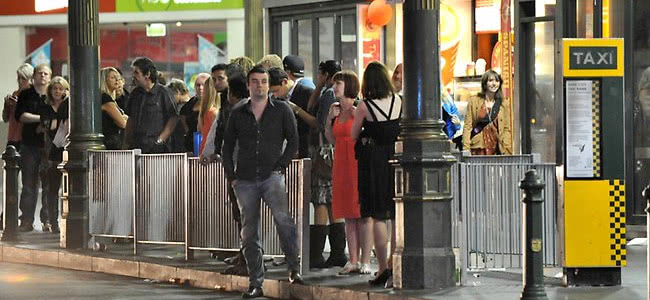Amongst the knee-jerk reactions plaguing the live music and licensed venue industries across the country, including mandatory ID scanners, ban on shots, reduced closing hours, and even sniffer dogs, a council in Melbourne has finally come up with a plan that actually makes sense.
According to The Age, the City Of Yarra recently decided to explore the idea of manning taxi ranks in the busiest venue hot spots such as Brunswick street, Smith street, and Swan street in Melbourne’s north to combat alcohol-fueled violence and increase safety for those seeking a ride home.
Five of the nine councillors who sit on Yarra’s council voted last week to explore the idea of using council staff to take charge of the popular ranks, instead of installing more CCTV cameras across the city – a ‘quick fix’ favourite of conservative politicians around the country.
The proposal comes after the New South Wales government announced tough new laws and restrictions on hundreds of Sydney’s music venues, and as the campaigning begins in Melbourne city for the next Lord Mayor, with candidate John Elliot vowing to introduce a 1am lockout for all nightclubs and venues – including those that host live music.
The South Australian government has also been busy cracking down on alcohol-fueled violence, with Primer Jay Weatherill and his government have already moved to introduce a new code of practice for licensed venues in Adelaide that will ban shots, glassware and introduce scanning IDs.
The move follows the Weatherill government’s recent introduction of hefty new liquor licensing fees, with new tariffs for late night venues; which will no doubt affecting the business and culture of many Adelaide-based clubs and live music venues who rely on late night trading to fund music activities.
Even federal Opposition leader Tony Abbott has thown his hat into the issue of late night drinking, pledging that a Coalition government would spend $50 million over four years on CCTV technology for the biggest crime spots across the country.
But not everybody is convinced that the proposal by Yarra’s Socialist councillor Anthony Main has merit. Councillor Main’s rival on the council, The Greens, have slammed the move as opportunistic following the high-profile abduction of ABC Radio employee Jill Meagher from Brunswick street last month.
Greens councillor Amanda Stone said the City of Yarra had already begun looking at ways to improve safety around nightspots and that Main was exploiting the recent tragedy for votes in the forthcoming council election.
”He was coming in on the back of a very emotional environment at the moment with some fairly reactive proposals which could undermine the work we’re already doing,” Ms Stone said.
But councillor Main dismisses the accusations, saying that previous proposals included increased use of CCTV cameras that were expensive, citing little to no evidence they worked in actually preventing crime.
Municipal Association of Victoria chief executive Rob Spence is also sceptical of the idea, saying he was concerned the use of council staff at late night trouble spots could put workers in harms way in situations that are better dealt with by police or security staff who are properly trained.
According to Mr Spence, there has not been a strong take-up of CCTV cameras by local councils due to high costs and questions on the effectiveness of the technology, with studies showing CCTV was effective in helping resolve crimes but had little impact in preventing crime.
Mr Main however insists the City Of Yarra would be better off training staff to work as ”safety officers”. “That’s what we’re envisaging,” he added. “Council officers properly trained. It’s not so much a security-type person, more a social worker calming people down, setting a bit of order, someone you can talk to, administer first aid or help you get a cab.
Meanwhile Brian Kearney, Chief Executive for Australian Hotels Association Victoria, is busy promoting the use of ID scanners at licensed venues, claiming their use had played an important role in the reduction of crime in licensed venues, which a recent police report demonstrates is down 4.3% from the previous year.
NSW Council of Civil Liberties president Cameron Murphy has called the introduction of ID scanning a “gross invasion of privacy”, and there are also concerns that the potential increase in use of CCTV cameras could raise more privacy problems, potentially denying people their civil liberties.
Of course, between a 1am lock out, mandatory ID scanning, a ban on shots, and patrolling sniffer dogs – you have to wonder if we’re all just better off staying at home.

































